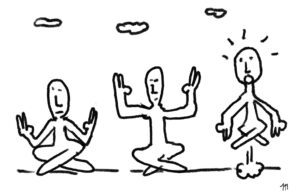Is Meditation Against Christianity ?
Welcome to the whimsical world of meditation, where stillness speaks louder than words!
Imagine meditation as a quirky friend, always surprising you with its depth.
Now, let’s dive into this tranquil pool of calm, shall we?
Key takeaways
![]() They are friends (according to the Holy Bible).
They are friends (according to the Holy Bible).
![]() The Bible often mentions meditation to meditate on God’s laws and teachings.
The Bible often mentions meditation to meditate on God’s laws and teachings.
![]() Catholic meditation is seen as beneficial.
Catholic meditation is seen as beneficial.
What Does The Christian Bible Say About Meditation ?

When it comes to meditation, the Christian Bible isn’t playing hide-and-seek.
It’s surprisingly forthright about it.
Biblical meditation is less about emptying the mind and more about filling it with divine insights.
Think of Biblical meditation as a spiritual smoothie – blending contemplation, prayer, and reflection. It’s like marinating in God’s word, letting the flavors seep deep into your soul. Now, let’s break down what the Bible actually says:
- Meditation is like a treasure hunt in Scripture, seeking jewels of wisdom and understanding (Psalm 119:15).
- It encourages pondering God’s works, like replaying a divine highlight reel (Psalm 77:12).
- Biblical meditation involves a joyous reflection on God’s love and promises (Psalm 104:34).
It’s not about sitting in a trance-like state. It’s more about actively engaging with the text. Think of it as having a cup of coffee with the scriptures, stirring in questions and sipping on revelations.
But wait, there’s more! Biblical meditation isn’t just a solo act.
It’s a communal experience, shared among believers. It’s like a group jam session, but with spiritual insights instead of instruments.
And here’s a fun twist: Meditation in the Bible is not just about personal enlightenment. It’s about aligning your life with God’s will (Joshua 1:8). It’s like spiritual alignment for your soul’s journey.
So, what’s the takeaway? Meditation, according to the Bible, is a vibrant, active, and joyful practice. It’s not a mystical, far-out journey, but a grounded, scripture-soaked pilgrimage. For a deeper dive into Biblical perspectives on meditation, check out Biblical Meditation.
Can You Meditate While Being Christian ?
Wondering if you can meditate as a Christian? Spoiler alert: It’s a big, resounding yes!
Meditating as a Christian isn’t just allowed; it’s like adding extra toppings to your spiritual pizza.
Now, don’t get it twisted.
Christian meditation isn’t about zoning out; it’s about tuning in. Tuning into Scripture, God’s presence, and His whispers in your heart. Here’s how meditation fits into the Christian lifestyle:
- Scripture Soak: Dive deep into biblical passages, letting them marinate in your mind.
- Prayerful Pondering: Use meditation to enhance your prayer life, adding depth and focus.
- Godly Gaze: Focus your meditation on God’s attributes, His love, and His works.
Christian meditation is like a spiritual workout for your faith muscles. It strengthens your connection with the Big Guy upstairs. And no, you don’t have to sit cross-legged or chant ‘Om’.
It’s all about finding a quiet spot to let God’s word resonate in you. Think of it as a divine download session, where you receive wisdom straight from Heaven’s server. And yes, it’s totally compatible with Christian beliefs.
So, can Christians meditate? Absolutely! It’s not just allowed; it’s encouraged. It’s like adding a spiritual vitamin to your daily routine.
In short, meditating as a Christian is like having a heart-to-heart with God. It’s quiet time where you can really listen to what He has to say.
So, grab your Bible, find a cozy corner, and start your spiritual deep dive. Happy meditating!
No boundaries
Meditation’s journey is indeed a mosaic of traditions. It’s fascinating how this practice transcends geographical boundaries, connecting disparate cultures through a common thread. Across the globe, different cultures nurtured their unique forms of meditation. Let’s list a few:
- Sufi Whirling: A mesmerizing dance of the Sufi mystics, seeking unity with the divine.
- Native American Vision Quests: A rite of passage involving deep meditation in nature.
- Japanese Zen Meditation: A disciplined practice of mindfulness and concentration.
Interestingly, meditation’s evolution is not just a story of spiritual pursuit. It played a crucial role in shaping cultural and artistic expressions. In the intricate carvings of Angkor Wat, Cambodia, and the transcendent poetry of Rumi, we see imprints of meditative influence.
Today, modern neuroscience is fascinated by meditation’s impact on the brain. Pioneering studies are revealing how this ancient practice can transform our neural landscapes. To learn more about the latest research on meditation and the brain, check out this insightful article.
In essence, meditation is not just a practice but a journey through time and culture. It’s a bridge connecting the ancient wisdom of our ancestors with the modern quest for wellbeing.
As we delve deeper into meditation’s history, we uncover a rich legacy, a legacy that continues to inspire and enlighten.
Christian Contemplation: A Spiritual Journey

In the realm of Christian meditation, it’s all about finding that divine connection.
It’s like a spiritual hug, embracing the soul in God’s presence. This isn’t your average sit-and-zen; it’s a deep dive into the ocean of faith.
Christian meditation is a symphony of prayer, scripture, and silence. It’s less about emptying the mind, more about filling it with divine love.
Think of it as a heart-to-heart with the Almighty, minus the small talk.
Now, let’s meet some historical Christian figures who were rockstars of contemplative practice. These saints and mystics knew how to strike a chord with the divine.
They were the pioneers, leading a spiritual revolution with quiet contemplation.
Saints like Teresa of Ávila and John of the Cross were like spiritual superheroes. They navigated the complexities of faith with meditative finesse. Their mystical writings are not just religious texts; they’re handbooks for the soul.
Here’s a quirky fact: Some of these mystics had experiences so intense, they’re now blockbuster material. Ever heard of ‘the dark night of the soul’? Yep, that’s from a mystic’s diary!
History of Christian Meditation contributions
| Saint/Mystic | Contribution to Christian Meditation |
|---|---|
| Teresa of Ávila | Authored ‘The Interior Castle’, a guide to spiritual development through meditation. |
| John of the Cross | Explored the ‘dark night of the soul’, a journey of spiritual purification. |
| Francis of Assisi | Emphasized nature and simplicity in seeking divine connection. |
Modern practitioners are taking cues from these legends. They’re blending ancient wisdom with today’s hustle. For a fresh take on Christian meditation, check out this cool site.
So, Christian meditation? It’s an ancient art with a modern twist. It’s not just sitting in silence; it’s a dialogue with the divine. Whether through the words of saints or the silence of prayer, it’s a journey worth embarking on. After all, who wouldn’t want a spiritual superpower?
Welcome to the world where myths about meditation get busted, not gently, but with a bang! Here, misconceptions don’t stand a chance. Get ready to separate the wheat from the chaff, meditation-style!
Misconceptions and Clarifications

First up, let’s shatter some myths about what meditation isn’t.
It’s not a VIP club for enlightened beings only.
Nor is it a magical solution to life’s every problem. Think of it more as a gym for your mind, minus the heavy lifting.
Meditation isn’t about turning off your thoughts like a light switch. It’s about learning to dance in the rain of your thoughts. It’s not about achieving a blank mind; it’s about becoming friends with your mind, quirks and all.
Now, let’s talk about aligning meditation with Christian beliefs. It’s not about replacing prayer with quietude. Instead, it’s about enriching your spiritual journey.
Think of it as adding a layer of peace to your faith.
Christian meditation isn’t a departure from Biblical teachings. It’s a deep dive into them, using silence as a tool. It’s about seeking God’s presence in the stillness, not in the storm.
Here’s a quick table to debunk some common myths:
| Myth | Reality |
|---|---|
| Meditation is only for Eastern religions. | It’s a universal practice, found in many cultures and religions, including Christianity. |
| Meditation requires perfect silence. | It can be practiced amidst noise and chaos. It’s about inner silence. |
| Meditation is escaping reality. | It’s about being more present and aware of your reality. |
For more myth-busting fun, check out Meditation Myths Debunked.
In summary, meditation is a versatile and inclusive practice. It’s a tool for mental clarity, not a one-size-fits-all solution.
For Christians, it’s a path to deepen faith, not deviate from it.
So, let’s embrace meditation with open minds and hearts, shall we?
The Intersection of Meditation and Christian Theology
Meditation and Christian theology? It’s not a mismatched duo, but a harmonious pair. They’re like peanut butter and jelly for the soul. Meditation complements Christian beliefs, adding depth and texture to spiritual practices.
Think of meditation as a quiet ally to Christian doctrine. It’s a spiritual exercise, enhancing one’s connection to God. Meditation in Christianity isn’t about emptying the mind; it’s about focusing it on divine truths.
Now, let’s look at meditation through the lens of the Bible.
Scriptural synergy is real, and it’s fascinating.
Meditation can illuminate biblical teachings, bringing ancient words to life in today’s context.
In the Bible, meditation is often mentioned. Psalms talk about meditating on God’s word day and night. It’s not an alien concept in Christianity; it’s deeply rooted in scripture.
Here are a few ways meditation complements Christian doctrine:
- Meditation helps in understanding biblical passages more deeply.
- It aids in personal reflection and spiritual growth.
- Meditation fosters a stronger sense of peace and connection with God.
Meditation also encourages a form of prayer that’s reflective and introspective. It’s like having a heart-to-heart with God, minus the external distractions. For a deeper dive into meditation and the Bible, check out Biblical Meditation.
In essence, meditation in Christianity is about enriching one’s faith. It’s not a detour from Christian teachings, but a path that leads closer to them.
So, let’s embrace this spiritual symbiosis, where meditation and theology walk hand in hand.
After all, a little quiet time with the Big Guy upstairs never hurts, right?
Personal Narratives: Testimonies and Experiences
In the world of faith and meditation, personal stories add a sparkle. They’re like spiritual selfies, capturing moments of divine connection. Let’s dive into these narratives and see how meditation has enhanced Christian faith for many.
Christian practitioners have some juicy tales to tell about meditation. It’s not about levitating or having out-of-body experiences. It’s about finding peace, understanding, and a deeper connection with God. These stories are like a warm cup of tea for the soul, comforting and enlightening.
Here’s a table showcasing some heartfelt stories:
| Name | Experience with Meditation | Impact on Faith |
|---|---|---|
| John | Started meditation to manage stress. | Found a deeper understanding of biblical teachings. |
| Mary | Turned to meditation during a personal crisis. | Experienced increased feelings of peace and closeness to God. |
| David | Practiced meditation to enhance prayer life. | Developed a more focused and meaningful prayer routine. |
It’s clear that meditation isn’t just sitting in silence; it’s an active journey of self-discovery. And for many Christians, this journey has brought harmony to their faith. Their testimonials are like beacons, guiding others on a similar path.
One practitioner, Sarah, describes meditation as her ‘spiritual espresso’. It gives her that extra zest in her spiritual life, making her daily routines more mindful and prayerful. These narratives aren’t just stories; they’re lifelines for those seeking a similar transformation.
To read more about personal experiences of Christian meditation, check out Faithful Meditation Stories.
Each testimony is unique, yet they all share a common theme: Meditation has enriched their Christian journey. It’s not about changing beliefs; it’s about deepening them. So, let’s celebrate these personal narratives, the living proof that meditation and faith can dance beautifully together.
Meditation Techniques Aligned with Christian Practice
When it comes to mixing meditation with Christian practices, it’s like adding spice to a favorite dish.
It’s all about finding techniques that nurture faith, not just the mind. Let’s explore some meditation methods perfectly seasoned for Christian beliefs.
‘Breath of Life’ techniques are a hit in Christian meditation. Think of your breath as a prayer conveyor belt, delivering thoughts to God.
These methods focus on breathing to promote relaxation and spiritual connection. It’s not just inhaling and exhaling; it’s about breathing with intention and devotion.
Now, let’s talk about ‘Guided by Scripture’ meditation. This is where the Bible isn’t just read; it’s experienced.
Meditators use scriptural passages as a focus point, diving deep into the words and uncovering new insights. It’s like having a heart-to-heart with the scriptures, finding personal meanings in ancient texts.
Here are some popular techniques:
- Lectio Divina: A method of reading, meditating, praying, and contemplating scripture passages.
- Contemplative Prayer: Focusing on a word or phrase from the Bible during meditation.
- Scripture Visualization: Imagining oneself within a biblical story or scene.
These techniques aren’t just about quiet time; they’re about deepening one’s relationship with God. They help Christians connect the dots between their faith and their meditation practice. It’s like building a bridge between the mind and the spirit, using the Bible as the blueprint.
For those curious to dive deeper, Scripture Meditation Techniques offers an extensive guide. From novices to seasoned meditators, everyone can find a method that resonates with their Christian faith.
In essence, these techniques are about making meditation a part of Christian life. They are tools to enhance spiritual understanding and foster a closer bond with God.
So, let’s embrace these practices with an open heart and mind, and see where this spiritual journey takes us!
Navigating Challenges and Concerns
Mixing meditation with faith can feel like walking a tightrope. It’s about balancing, not choosing sides. This section addresses those tricky questions and concerns head-on.
One hot topic: Is meditation a form of idolatry?
This concern pops up like an uninvited guest at a faith party. The answer? Not necessarily.
Meditation, in its pure form, is about inner awareness, not worshipping foreign deities. It’s about exploring the mind, not replacing God.
Walking the path of meditation with faith requires caution. It’s like adding salt to a dish – a little enhances, too much spoils. The key is to align meditation practices with Christian values, not to overshadow them.
Let’s break down some common concerns and how to navigate them:
| Concern | Meditation Practice | Christian Alignment |
|---|---|---|
| Idolatry Fears | Focusing on breath or a biblical phrase. | Ensuring focus is on God or His Word, not on other entities. |
| Misaligning Beliefs | Using non-Christian mantras or teachings. | Choosing scriptures or Christian-centered themes for meditation. |
| Loss of Traditional Prayer | Replacing all prayer with silent meditation. | Using meditation to complement, not replace, traditional prayer methods. |
Remember, meditation in a Christian context isn’t a departure from faith. It’s a tool to deepen it. Think of it as a spiritual supplement, enhancing your faith journey, not derailing it.
For those seeking more guidance on this delicate balance, Faithful Meditation Balance is a great resource. It offers insights and tips on integrating meditation into Christian life without compromising beliefs.
In summary, navigating the challenges and concerns of combining meditation with faith is about mindful integration.
It’s about ensuring that each step on the meditation path aligns with Christian values.
So, tread carefully, but don’t be afraid to explore the enriching world of meditation within your faith journey.
Expert Insights: Theological Perspectives

When it comes to meditation and Christianity, expert opinions are like spices in a stew – they add flavor and depth.
Let’s hear from the big brains: church leaders and theologians. Their insights offer a well-seasoned perspective on this spiritual blend.
Clerical wisdom is invaluable in this discourse. Church leaders often provide guidance on integrating meditation into Christian life.
They’re like spiritual GPS systems, helping navigate the faith journey. What they say about meditation is often a mix of caution and encouragement.
Now, onto the theologians. These academic heavyweights provide a scholarly take on meditation and Christianity. They dissect, analyze, and offer insights that are both profound and practical. Their perspectives are like a masterclass in spiritual synthesis.
Here’s a table summarizing their views:
| Expert | Perspective on Meditation | Relevance to Christianity |
|---|---|---|
| Bishop Walton | Advocates for mindful prayer and contemplation. | Emphasizes meditation as a path to deeper spiritual understanding. |
| Professor L. Jones | Studies meditation’s effects on mental health. | Links mental wellbeing with spiritual growth in Christian contexts. |
| Reverend Smith | Warns against non-Christian practices in meditation. | Advises aligning meditation with biblical teachings. |
These expert insights aren’t just opinions; they’re beacons of knowledge, guiding the faithful on their meditation journey. They balance the act of embracing new practices with maintaining core Christian beliefs.
For a deeper exploration of theological perspectives on meditation, Theological Meditation Insights is a treasure trove of information. It delves into various expert opinions, offering a comprehensive view of this complex topic.
In essence, the expert insights from church leaders and theologians offer a nuanced understanding of meditation in Christian life.
They remind us that this journey is not just about personal experience, but also about aligning with the broader Christian tradition.
Conclusion
As we wrap up this exploration, let’s tie it all together. Meditation and Christianity can indeed form a harmonious duo. It’s about embracing a holistic spiritual journey, where mind, body, and spirit align.
Integrating meditation into Christian living is like finding a unifying thread in a diverse tapestry. It’s not about replacing traditional practices, but enhancing them. Meditation offers a new lens through which to view faith, adding depth and vibrancy to Christian life.
In final reflection, meditation emerges as a complementary practice to Christianity. It’s like adding a new instrument to an orchestra, enriching the overall harmony. Meditation doesn’t overshadow faith; it illuminates it, revealing new facets and depths.
This journey of integration is personal and unique for each individual. It’s a path of discovery, where one learns to balance tradition with modern practices, scripture with silence, prayer with contemplation. Embracing meditation in Christian life is about enriching one’s spiritual journey, not embarking on a new one.
Meditation, in the context of Christianity, is an invitation to explore a deeper relationship with God. It’s a call to a more mindful, reflective, and connected spiritual life. As we continue on this journey, let’s keep our minds open, our hearts receptive, and our spirits willing to explore the vast expanse of spiritual possibilities.
Most Asked Questions
So, let’s soak in their wisdom and navigate our spiritual paths with enlightenment and grace.
What does the Christian Bible say about meditation?
The Bible views meditation as deep contemplation and a tool for understanding and being changed by God’s truth. It’s not about avoiding meditation but using it with care and biblical understanding.
Can you meditate while being Christian?
Yes, Christians can practice meditation through Lectio Divina (meditating on scripture), Visio Divina (meditating on sacred art), or praying the Rosary while meditating on moments of Jesus’ life.
Should Christians practice mindfulness meditation?
Mindfulness meditation can be a valuable tool for Christians for developing spiritual maturity and strength, enhancing mood, attentiveness, and supporting physical health.
Is there a dark side to meditation?
Some studies indicate potential negative effects of meditation, such as fear, panic, hallucinations, mania, loss of motivation and memory, and depersonalization.
Can Catholics meditate?
Catholic meditation is seen as beneficial, often reducing anxiety and helping in preparation for action or self-soothing after an action.
Does the Bible say not to meditate?
The Bible often mentions meditation in conjunction with obedience, encouraging meditating on God’s laws and teachings.
Can too much meditation be harmful?
In some cases, meditation and mindfulness can cause negative side effects like disrupting social relationships, sense of self, and physical health.
What are the negative effects of meditation?
Some negative side effects from meditation include increases in depression, anxiety, and even psychosis or mania.
Why do I feel worse after meditation?
About one in 12 people who try meditation experience an unwanted negative effect, often a worsening in depression or anxiety.
Is yoga a sin for Christianity?
Yoga is not a religion, and practicing it is not considered a sin in Christianity. However, some aspects of yoga might be seen as religious.
How should Christians approach meditation?
Christians should focus on God, reflect on the Bible, engage in prayer, find stillness, and be consistent in their meditation practice.
How is Christian meditation different from Eastern meditation?
Christian meditation involves actively filling the mind with God’s truth and focusing on Scripture, while Eastern meditation often involves emptying the mind and mental passivity.
What steps can Christians take to develop the discipline of meditation?
Christians can start by focusing on God’s presence, peruse Scripture, apply imagination and senses to the text, and then engage in prayer, personalize scripture, praise God, and practice what the Word commands.